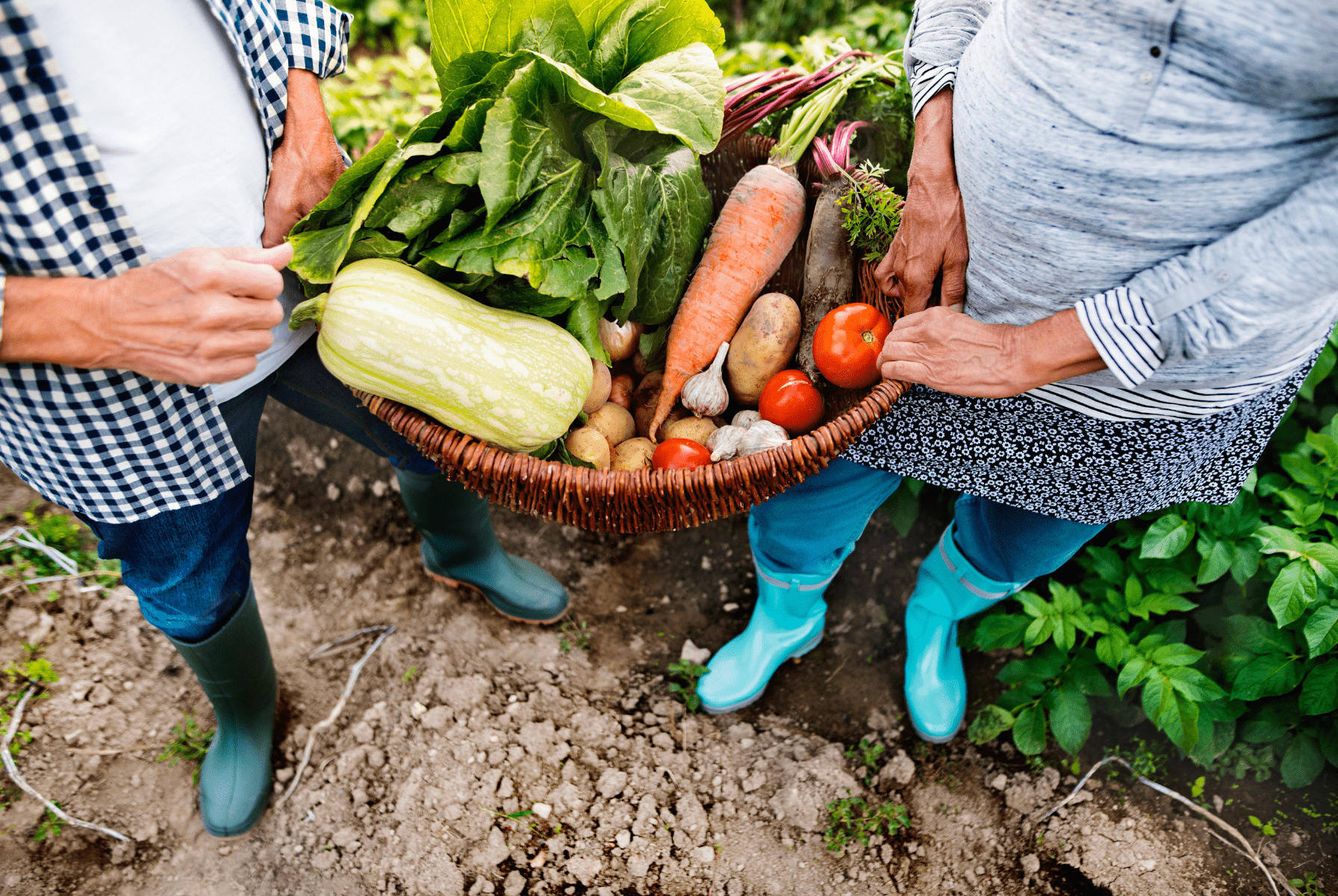
From Garden to Wellness: The Health Benefits of Growing Your Own Food
You’ve probably heard the age-old adage, “You are what you eat.” While it may sound cliché, it couldn’t be truer. The food you consume plays a pivotal role in your overall health and well-being. But what if there was a way to take even more control of your nutrition and embrace a healthier lifestyle? Well, there is, and it might be right in your own backyard or even on your windowsill.
In this article, we’ll explore the incredible health benefits of growing your own food. From the physical exercise, it provides to the pure, unadulterated freshness of homegrown produce, this journey from garden to wellness is one worth embarking on. So, grab your gardening gloves and get ready to cultivate a healthier, happier you.
The Physical and Mental Health Benefits
Beyond the nutritional aspects, there are significant physical and mental health benefits associated with growing your own food. Let’s dive into how this green-thumbed hobby can have a positive impact on your well-being.
1. Exercise and Fresh Air: Gardening gets you moving and outdoors. It’s a physical activity that can improve your cardiovascular health, build strength, and enhance flexibility. Digging, planting, weeding, and harvesting are all tasks that engage different muscle groups. Plus, you get to soak in the vitamin D from the sun, which is essential for bone health and mood regulation.
2. Stress Reduction: Spending time in a garden is known to reduce stress and promote relaxation. The combination of fresh air, natural surroundings, and the gentle rhythm of gardening can have a calming effect. It’s a form of mindfulness that allows you to unplug from the stresses of daily life.
3. Cognitive Benefits: Gardening is not only physical but also a mentally stimulating activity. Planning your garden layout, learning about different plants, and troubleshooting garden issues all challenge your brain. It’s a hands-on learning experience that keeps your mind sharp.
4. Connection to Nature: Being in nature has a profound impact on mental health. It instills a sense of wonder, appreciation, and connection to the world around us. Gardening allows you to witness the cycles of life up close, from planting a tiny seed to nurturing a thriving plant.
5. Sense of Accomplishment: Watching your garden flourish through your efforts is immensely satisfying. It gives you a sense of accomplishment and pride, boosting your self-esteem. There’s a unique satisfaction in knowing you’re providing fresh, organic produce for yourself and your family.
In the fast-paced, tech-driven world we live in, the simple act of tending to a garden can offer a much-needed respite. It’s a way to disconnect from screens, de-stress, and enjoy the present moment. Gardening provides an opportunity to practice mindfulness, focus on the task at hand, and appreciate the wonders of the natural world.
Environmental Benefits of Growing Your Own Food
The benefits of growing your own food extend beyond personal health and wellness. They also encompass a positive impact on the environment, making it a win-win for you and the planet.
1. Reduced Carbon Footprint: When you grow your own food, you eliminate the need for long transportation routes that store-bought produce often entails. This significantly reduces the carbon footprint associated with your meals. Your veggies and fruits don’t have to travel thousands of miles before they reach your plate.
2. Less Food Waste: Home gardeners can be more efficient in harvesting what they need, resulting in less food waste. Unlike large-scale farming, where produce often goes unsold and is discarded, you can pick only what you need when you need it.
3. Healthier Soil: Conventional agriculture can deplete soil nutrients and rely on chemical fertilizers. Home gardening, especially if done organically, promotes soil health. It encourages crop rotation, composting, and natural pest control methods, leading to richer, more fertile soil.
4. Biodiversity: Large-scale farming often relies on a small selection of crops for efficiency. This can lead to a loss of biodiversity. Home gardens, on the other hand, can be more diverse, including various fruits, vegetables, herbs, and even flowers. This diversity is crucial for maintaining a healthy ecosystem.
5. Reduced Pesticide Use: While home gardeners might use some form of pest control, they usually rely less on chemical pesticides. This reduces the overall amount of harmful chemicals entering the environment.
By growing your own food, you contribute to a more sustainable and eco-friendly food system. You minimize the negative impact on the environment and encourage responsible, planet-friendly food practices. Your garden can serve as a small but important piece of the broader sustainability puzzle.
Economic Benefits of Growing Your Own Food
While the primary focus of growing your own food is often on health and the environment, it’s worth mentioning the economic advantages it can offer.
1. Savings on Groceries: While there may be some initial investment in gardening tools, seeds, and soil, growing your own food can significantly reduce your grocery bills. The more you garden, the more you’ll save in the long run.
2. Income Potential: If your garden produces an abundance of fruits and vegetables, you might have surplus items to sell or trade with friends and neighbors. This can turn your gardening hobby into a small side business.
3. Reduced Food Inflation Impact: The price of store-bought produce can fluctuate with inflation and supply chain disruptions. Having your garden can shield you from some of these economic impacts.
4. Self-Reliance: Growing your own food cultivates a sense of self-reliance. You become less dependent on external food sources and gain a degree of food security.
5. Cost Transparency: When you grow your own food, you have complete transparency over how it’s produced. You know exactly what fertilizers or pesticides, if any, are used, providing peace of mind.
While the financial benefits of growing your own food may not make you a millionaire, they can certainly help you cut costs, reduce the impact of inflation on your grocery budget, and provide a degree of food security.
Getting Started: Tips for Your Garden-to-Table Journey
If you’re excited to start your journey from garden to wellness, here are some tips to help you get started:
1. Start Small: If you’re new to gardening, don’t bite off more than you can chew. Start with a few easy-to-grow plants and gradually expand as you gain confidence and experience.
2. Choose the Right Location: Ensure your garden gets enough sunlight and has good drainage. Different plants have different requirements, so plan your layout accordingly.
3. Learn About Your Plants: Each plant has its own needs in terms of water, soil, and care. Take the time to research and understand the specific requirements for what you’re growing.
4. Compost: Invest in a compost bin to recycle kitchen scraps and create nutrient-rich compost for your garden. It’s an eco-friendly way to fertilize your plants.
5. Be Patient: Gardening is a learning process, and there will be successes and failures. Don’t get discouraged by setbacks; they’re valuable learning experiences.
6. Get Kids Involved: If you have children, involve them in the gardening process. It’s a fantastic way to teach them about where their food comes from and get them excited about fresh, healthy eating.
7. Enjoy the Harvest: One of the most satisfying aspects of gardening is enjoying the fruits (or veggies) of your labor. Savor the delicious, fresh produce you’ve grown.
8. Embrace Sustainability: Whenever possible, use sustainable gardening practices. Choose organic methods, conserve water, and recycle materials.
9. Preserve Surplus: If you have more produce than you can consume, learn how to preserve it through canning, freezing, or pickling.
10. Share the Bounty: Don’t forget to share your extra produce with friends, family, and neighbors. It’s a great way to build community and spread the joy of homegrown food.
Gardening can be a rewarding and transformative journey from garden to wellness. It’s a way to take charge of your nutrition, prioritize health, reduce your environmental impact, and even save money. Whether you have a spacious backyard or a small
Conclusion
Economically, growing your own food empowers you to save on grocery bills, generate income from surplus harvests, and insulate yourself from the impact of food price fluctuations. It offers financial transparency, allowing you to know precisely what you’re consuming.
Your garden-to-wellness journey isn’t just about planting seeds; it’s about nurturing a healthier lifestyle. It’s a choice to prioritize health, sustainability, and self-sufficiency. So, roll up your sleeves, pick up that shovel, and start planting the seeds of your wellness journey. Your garden awaits, ready to provide you with the bountiful rewards of homegrown food.

References:
- Grow a Good Life. (2021, March 3). 10 reasons to grow a vegetable Garden. https://growagoodlife.com/grow-your-own-organic-food/
- Allen, M. (2021, August 26). The 6 environmental and health benefits of growing your own food. The Garden Continuum. https://www.thegardencontinuum.com/blog/the-6-environmental-and-health-benefits-of-growing-your-own-food
- BBC Gardeners’ World Magazine. (2023, May 24). How to grow vegetables – beginner veg to grow. https://www.gardenersworld.com/plants/vegetable-crops-for-beginners/
- Beck, A. (2023, January 23). 6 Secrets to Starting Your First Vegetable Garden Off Right. Better Homes & Gardens. https://www.bhg.com/gardening/vegetable/vegetables/planning-your-first-vegetable-garden/
- Blackwood, M., RN. (2022, April 15). Benefits of growing a vegetable garden. Healthier Steps. https://healthiersteps.com/benefits-of-growing-a-vegetable-garden/
- Gardener, E. (2018, December 4). What are the Benefits of Growing a Vegetable Garden? ECOgardener. https://ecogardener.com/blogs/news/what-are-the-benefits-of-growing-a-vegetable-garden
- Gardens, C.-. G. O. (2021, September 16). 12 benefits of having a vegetable Garden. Gaias Organic Gardens. https://www.gaiasorganicgardens.com.au/12-benefits-vegetable-garden/
- Godman, H. (2012, June 30). Backyard gardening: grow your own food, improve your health. Harvard Health. https://www.health.harvard.edu/blog/backyard-gardening-grow-your-own-food-improve-your-health-201206294984
- Grow a Good Life. (2021, March 3). 10 reasons to grow a vegetable Garden. https://growagoodlife.com/grow-your-own-organic-food/
- Grow your own vegetables to benefit your health and the environment. (2020, August 3). Illinois Extension. https://extension.illinois.edu/blogs/ilriverhort/2020-08-03-grow-your-own-vegetables-benefit-your-health-and-environment
- Harveston, K. (n.d.). 8 Benefits Of Growing Your Own Veggies. Vegan First. https://www.veganfirst.com/article/8-benefits-of-growing-your-own-veggies
- Magazine. (2023, August 21). How to plant a vegetable garden. Insurance & Personal Finance Articles. https://blog.nationwide.com/family-life/travel-outdoors/tips-for-planting-garden/
- Market, U. R. G. (2022, May 26). The Top 5 Benefits of Growing your own Vegetables - Urban Roots Garden Market. Urban Roots Garden Market. https://urbanrootsgardenmarket.ca/the-top-5-benefits-of-growing-your-own-vegetables/
- SanSone, A. E. (2023, March 29). 11 things beginners should know before starting a vegetable garden. Country Living. https://www.countryliving.com/gardening/garden-ideas/g43413616/vegetable-garden-for-beginners/
- The benefits of growing your own fruits and vegetables | MiracleGro. (n.d.). Miracle-Gro. https://miraclegro.com/en-us/gardening-101/the-benefits-of-growing-your-own-fruits-and-vegetables.html
- Vegetable Gardening: A Beginner’s Guide | NC State Extension Publications. (n.d.). https://content.ces.ncsu.edu/home-vegetable-gardening-a-quick-reference-guide
- Vegetable Gardening for Beginners: The Complete guide. (n.d.). Almanac.com. https://www.almanac.com/vegetable-gardening-for-beginners
